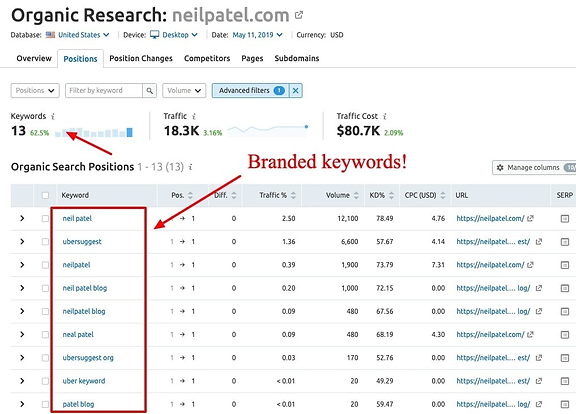What are branded keywords?
Branded keywords are often used by consumers who are already familiar with a brand and want to find more information or make a direct purchase.
These keywords are typically associated with a specific brand and are used to target a specific audience who already has some level of brand awareness. A branded keyword refers to a specific keyword or phrase that includes the name or brand of a particular company, product, or service.
It is typically used by individuals searching for a specific brand or product. For example, “Nike running shoes,” “Apple iPhone,” or “Coca-Cola soft drinks” are all examples of branded keywords.
Branded keywords can be important for businesses as they allow them to protect and promote their brand by appearing prominently in search engine results for their specific brand-related terms. It can also help businesses to drive targeted traffic to their website and increase brand visibility and recognition.
Overall, branded keywords are a strategic aspect of digital marketing and search engine optimisation (SEO) efforts, allowing businesses to leverage their brand recognition and capture relevant search traffic.

What are non-branded keywords?
Non-branded keywords are search terms that do not include specific brand names or trademarks. They are used by individuals who are looking for information, products, or services without a specific brand in mind.
Non-branded keywords typically describe a category or attribute of what the user is searching for. For example, if someone is searching for “running shoes,” “smartphone reviews,” or “carbonated beverages,” these are all examples of non-branded keywords.
The search intent behind these terms is to find a variety of options and compare different brands or products within that category.
Non-branded keywords are often used at the early stages of the customer journey when individuals are conducting research, exploring options, or trying to solve a problem. They may be seeking information, comparisons, reviews, or general guidance before making a purchasing decision.
For businesses, targeting non-branded keywords can be challenging as they face more competition from various brands and websites. However, it is an opportunity to attract potential customers who are actively looking for solutions or products related to a specific category.
To rank for non-branded keywords, businesses can focus on providing valuable and informative content, optimising their website for relevant keywords, building backlinks from authoritative sources, and delivering a positive user experience.
By addressing the needs and interests of users searching for non-branded keywords, businesses can establish themselves as trusted sources and increase their visibility in search engine results.

How to get ranking for a branded keyword?
To improve your ranking for a branded keyword, you can follow these steps:
- Optimise your website: Ensure that your website is optimised for search engines. This includes using relevant keywords in your page titles, meta descriptions, headings, and content. Incorporate your branded keyword naturally throughout your website to signal its relevance.
- Create high-quality content: Develop informative and engaging content that incorporates your branded keyword. This can include blog posts, articles, videos, and other types of content that provide value to your audience. The more valuable and relevant your content is, the more likely it is to attract traffic and improve your ranking.
- Build backlinks: Backlinks from reputable and relevant websites can significantly impact your search engine ranking. Reach out to industry influencers, bloggers, and relevant websites to request backlinks to your website using your branded keyword as the anchor text. Additionally, create valuable content that others will naturally link to, further improving your backlink profile.
- Leverage social media: Utilise social media platforms to promote your brand and engage with your audience. Regularly post content related to your branded keyword and encourage social sharing. This can increase brand visibility and drive traffic to your website, positively impacting your ranking.
- Optimise your local presence: If you have a physical location, optimise your local presence. Claim and optimise your Google My Business listing, ensuring that your branded keyword is included in your business name, description, and other relevant fields. Encourage customers to leave reviews, as positive reviews can also contribute to your ranking.
- Monitor and analyse: Regularly monitor your website’s performance using analytics tools. Track your ranking for the branded keyword and evaluate the effectiveness of your optimisation efforts. Adjust your strategy as needed based on the data to continually improve your ranking.
Remember that ranking for a branded keyword often requires consistency, patience, and a holistic approach to SEO and digital marketing. By implementing these strategies, you can increase your chances of improving your ranking and attracting more targeted traffic for your branded keyword.

Is ranking for a branded search easy?
Ranking for a branded search can be relatively easier compared to ranking for non-branded or competitive keywords. Here are a few reasons why:
Brand relevance: When someone searches for a specific brand or product, search engines typically prioritise the official website or authoritative sources associated with that brand. If you own the brand or have a strong online presence for it, you have a higher chance of ranking well.
Lower competition: Branded searches usually have lower competition compared to generic or non-branded keywords. Since you are targeting a specific brand, you are likely to face less competition from other websites trying to rank for the same keyword.
Brand authority: If your brand has a strong online presence, a loyal customer base, and a history of delivering quality products or services, search engines are more likely to consider your website as a reliable and authoritative source. This can positively impact your ranking for branded searches.
Exact match: Branded searches often involve an exact match of the brand name or specific product, which increases the relevance of your website to that search query. Search engines recognise this match and prioritise showing relevant results.
However, it’s important to note that ranking for a branded search is not guaranteed to be easy in all cases. It depends on factors such as the uniqueness of your brand name, the competitiveness of your industry, and the online presence of your competitors. Additionally, if your brand name is a common term or has multiple meanings, ranking can be more challenging.
To improve your chances of ranking well for branded searches, it’s crucial to consistently build your brand’s online presence, optimise your website for search engines, and provide valuable content and experiences to your audience.











We have been working with Amax Marketing for the last few weeks and have already been impressed with the results we've seen.
As experts in outreach and digital PR, we knew we'd be in safe hands. We are looking forward to the coming months, and getting some fantastic results!